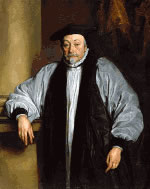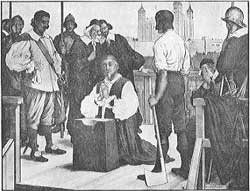Readings:
Wisdom 1:6-15
Psalm 73:24-29
Hebrews 12:5-14
Matthew 10:32-39Preface of a Saint (2)
[Common of a Pastor] [Common of a Martyr]
[Of the Holy Cross]
PRAYER (traditional language):
Keep us, O Lord, constant in faith and zealous in witness;
that, like thy servant William Laud, we may live in thy fear, die in thy
favor, and rest in thy peace; for the sake of Jesus Christ thy Son our
Lord, who liveth and reigneth with thee and the Holy Spirit, one God,
for ever and ever. Amen.
PRAYER (contemporary language):
Keep us, O Lord, constant in faith and zealous in witness;
that, like your servant William Laud, we may live in your fear, die in
your favor, and rest in your peace; for the sake of Jesus Christ your
Son our Lord, who lives and reigns with you and the Holy Spirit, one God,
for ever and ever. Amen.
Lessons revised at General Convention 2024.
Return to Lectionary Home Page
Webmaster: Charles Wohlers
Last updated: 9 Nov. 2024
WILLIAM LAUD
ARCHBISHOP OF CANTERBURY (10 JANUARY 1645)
 William
Laud, born in 1573, was Archbishop of Canterbury from 1633 to 1645 in
the days of King Charles I. It was a turbulent time throughout, one of
violent divisions in the Church of England, eventually culminating in
the English Civil War.
William
Laud, born in 1573, was Archbishop of Canterbury from 1633 to 1645 in
the days of King Charles I. It was a turbulent time throughout, one of
violent divisions in the Church of England, eventually culminating in
the English Civil War.
An example is the surplice controversy. We have all encountered Christians who are opposed to celebrating Christmas on the grounds that (a) the Bible nowhere commands us to celebrate Christmas, and does not mention the 25th of December; and (b) the pagans had a festival in December at which they built fires and feasted and exchanged gifts, from which it follows that those who celebrate Christmas are participating in pagan rites. Similarly, in the late 1500's and early 1600's, there were Christians in England who objected to the garment called the surplice. When participating in the services of Morning and Evening Prayer in Church, clergy, including choir members, normally wore a cassock (a black, floor-length, fairly tight-fitting garment) covered by a surplice (a white, knee-length, fairly loose garment with loose sleeves). The Puritans objected to the surplice (a) as not mentioned in the Bible, and (b) as something that the Roman Catholics had worn before the Reformation, which made it one of the props of idolatrous worship, and marked anyone who wore it as an idolater. Archbishop Laud regarded it as a seemly, dignified, garment, an appropriate response to the Apostle Paul's injunction, "Let all things be done decently and in order." The Puritans stood by their objections, and violently interrupted services at which the surplice was worn. On one occasion, a group of Puritans broke into an Oxford chapel the night before a service and stole the surplices, which they thrust into a the dung-pit of a privy. Again, a woman marched into Lichfield Cathedral, accompanied by the town clerk and his wife, and ruined the altar hangings with a bucket of pitch.
Under English Law, it was part of Laud's office as Archbishop to maintain order and to punish offences against the peace of the Church. He made it his practice to proceed not only against poor and obscure offenders, but also, perhaps especially, against rich and powerful ones. It is well that men should be equal before the law, but his integrity on this point ultimately cost Laud his life.
Laud was also the prosecutor of record in the trials of those who published seditious or violent and abusive attacks on the doctrine and discipline of the Church, and the Puritans produced an abundance of scurrilous attacks on those who disagreed with them, which were duly punished, with Laud taking the responsibility. In 1630 (before Laud became Archbishop), when Alexander Leighton published Zion's Pleas Against Prelacy, a violent attack on the Bishops as tools of Antichrist, he was sentenced to be publicly whipped and branded, and to have his ears cut off. He was sixty years old and a Doctor of Divinity, and the sentence aroused great public indignation. (It is not certain that it was actually carried out.)
Laud made enemies chiefly in three ways. (1) He punished those who attacked the Church, both those who vandalized and those who merely scolded. (2) He upheld various customs in public worship (such as the wearing of the surplice) that were harmless in themselves, but which aroused the suspicion and fury of those who feared a return to power of Roman Catholicism. (3) He sought the financial independence of the clergy, so that a preacher was not dependent on what support the local squire was pleased to give him. His proposed means to this end was to restore to the Church some of the Church lands that had been seized by Henry VIII and given or sold to various nobles and gentlemen. The proposal never reached the stage of discussion about details, so it was not clear how compensation would be handled, but the mere whisper of such a proposal was enough to make every landholder in the country feel personally threatened.
 |
William
Laud at his execution |
by James Kiefer